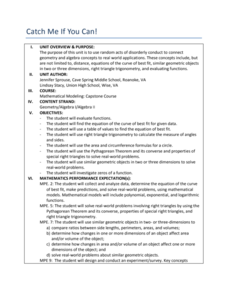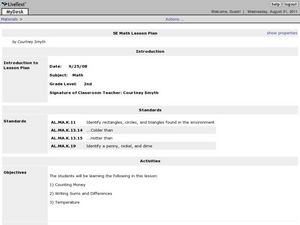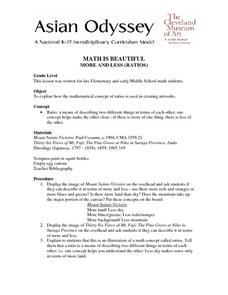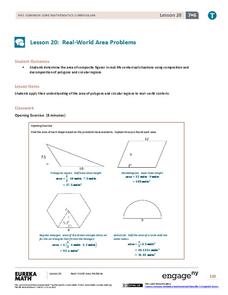CCSS Math Activities
Satellite
This isn't rocket science, you know. A performance task has learners use right triangle trigonometry to calculate distances from stations on Earth to a satellite. It also requires finding the distance between two stations along the...
Concord Consortium
"Equal" Equations
Different equations, same solution. Scholars first find a system with equations y1 and y2 that have a given solution. They then find a different system with equations y3 and y4 that have the same solution. The ultimate goal is to...
Mathematics Vision Project
Module 4: Similarity and Right Triangle Trigonometry
Right you are to use a great resource. Starting with a lesson on dilations, scholars learn about similarity transformations and similar triangles. They use the knowledge to develop an understanding of right triangle trigonometry in later...
Radford University
Big Future - How SAT Scores Play a Role in College Acceptance
Understanding the importance of SAT scores is as easy as ABC. A set of three statistics lessons teaches scholars about normal distributions, the Empirical Rule, and z-scores. They apply their newfound knowledge to investigate data...
Radford University
Catch Me If You Can!
Crime doesn't pay, but everyone can learn from it. Learners consider different situations involving mischief at a school, such as stink bombs and rockets, and analyze them using mathematics. They must apply trigonometry, quadratic...
Radford University
Parallel Lines Cut by a Transversal
Use the parallel lines to find your way. After first reviewing geometric constructions and the relationships between angles formed by parallel lines and a transversal, young mathematicians write proofs for theorems relating to parallel...
Radford University
How Much is in There? A Polygon Investigation
Try to find the triangles in various polygons. An investigation has learners develop a formula for the sum of the measures of the interior angles of a polygon. They use manipulatives to partition each polygon into triangles, then...
Radford University
Linear Programming: Sports Shoes
Don't shoo away the resource on shoes. Given constraints on the amount of leather and string needed to make two different types of shoes, learners graph a system of inequalities for the situation. They then determine the maximum profit...
Flipped Math
Calculus AB/BC - Defining Limits and Using Limit Notation
There's no limit to what one can learn about limits. The second of 18 videos in Unit 1 - Limits and Continuity focuses on understanding the basic concept of a limit. Pupils learn the definition of limits and see how to determine a limit...
Curated OER
Factoring Polynomials: GCF and Factoring by Grouping
Work your way through factoring polynomials with a worksheet that starts with the GCF and ends with factoring by grouping. Each page provides an example as well as an answer key for each section.
Soft Schools
Long Division Worksheets
They say practice makes perfect. If that's the case then these worksheets will have young mathematicians perfectly solving long division problems in no time.
Math Drills
Multiply Fractions by Whole Numbers (D)
Ten multiplication problems require aspiring analysts to multiply whole numbers with simple fractions. The denominators range from 2 to 13, and some of the answers can be simplified. Excellent practice to assign as homework!
Curated OER
Counting Money Activity
Second graders explore commerce by practicing monetary transactions. In this consumer math lesson, 2nd graders practice using math functions to add and subtract different amounts of money. Students identify the different monetary units...
Curated OER
MATH IS BEAUTIFUL: More And Less
Students use tempura paints and mixing techniques to explore the mathematical concept of ratios in this cross-curricular late-elementary/ealy middle level Math lesson. A homework assignment is included.
Wells Fargo
Wells Fargo History Museum: Curriculum Guide
Learn about the California Gold Rush from an institution that has been in place since the early days of the American West: Wells Fargo History Museum. From domain-specific vocabulary review to group research projects, an expansive packet...
Curated OER
Learning Unit: The Pythagorean Theorem
Middle and high schoolers research the life of Pythagoras and the Pythagorean theorem. They write a short biography of Pythagoras and learn to apply the theorem in their study of right triangles.
Math Drills
Converting Centimeters and Millimeters (A)
Practice converting measurements with a 24-problem worksheet focusing on the conversion of centimeters and millimeters.
EngageNY
Sequencing Reflections and Translations
Don't get out of order! Examine the effect of order on a sequence of transformations. Learners perform reflections and translation transformations in sequence. They see that changing the order of the transformations does not always have...
EngageNY
Real-World Area Problems
Not all structures take the shape of a polygon. The 21st lesson in a series of 29 shows young mathematicians they can create polygons out of composite shapes. Once they deconstruct the structures, they find the area of the composite figure.
EngageNY
Interpreting and Computing Division of a Fraction by a Fraction—More Models II
No more inverting and multiplying to divide fractions. Applying concepts of measurement division from the previous instructional activity, pupils consider partitive division using fraction bars and number lines. They first convert...
EngageNY
The Relationship of Addition and Subtraction
Add an outstanding resource to your repertoire. The first installment of a 36-part module looks at the relationship between addition and subtraction through an activity using tape diagrams. Pupils develop the identities w – x + x =...
EngageNY
Replacing Letters with Numbers II
Teach about properties properly. Individuals investigate the commutative and identity properties for both addition and multiplication. They see that the properties hold true for all values by using substitution to test out several examples.
EngageNY
Read Expressions in Which Letters Stand for Numbers III
Those key operation words sure come in handy. Groups continue their work with converting between different notations for algebraic expressions. They work in stations to write the symbolic form for given verbal phrases. This is the 17th...
EngageNY
Graphs of Functions and Equations
Explore the graphs of functions and equations with a resource that teaches scholars how to graph functions as a set of input-output points. They learn how the graph of a function is the graph of its associated equation.

























